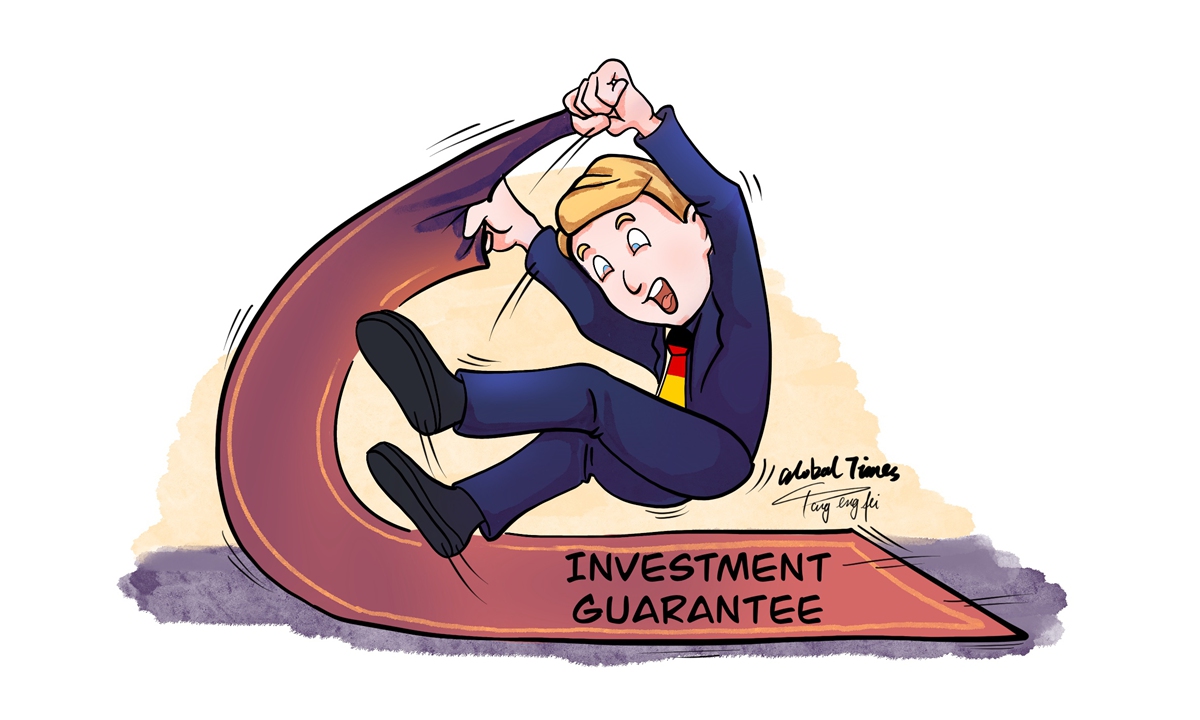
Illustration: Tang Tengfei/Global Times
German media outlet Handelsblatt recently published an article titled "A new China policy from the Ministry of Economic Affairs is necessary and overdue." The author calls on the German government to tighten guarantees for German companies' investments in China, and claims that there is no alternative to this harsh intervention.
The call came after Handelsblatt on Friday reported that the Federal Ministry of Economics of Germany is planning a change of course in its China policy and to tighten rules for state guarantees for German companies investing abroad due to the increasing dependence of German companies on the Chinese market at a time of increasing geopolitical tensions.
As geopolitical tensions are causing a severe impact on globalization, it is understandable that Germany is seeking to take a cautious attitude toward its companies' overseas investment plans. However, German economic policymakers need to think straight: Is a targeted tightening of investment guarantee rules for China necessary? What are the consequences of such a harsh intervention?
Evidently, there still remains fierce controversy over the question within the German government. Some German officials reportedly have argued that German companies with large presence in the Chinese market would suffer severe losses once such drastic tightening is formalized. And the business community has even fiercer objections.
According to current rules, German companies investing abroad have received state guarantees in advance, and if the investment fails, a proportion can be compensated by the state. A member of the executive board of the German Chamber of Commerce in China reportedly pointed it out that if German government makes such a drastic move, it will weaken the position of the German economy in global competition.
In May, the German Ministry of Economic Affairs refused to extend a guarantee for a Volkswagen investment in China, citing so-called "human rights" issues in China's Xinjiang region. On June 30, Volkswagen CEO Herbert Diess emphasized that the German economy needs China to guard against spiraling inflation. Diess said in December that it would be "very damaging if Germany or the EU wanted to decouple from China."
If one looks at the actual situation of the current China-Germany investment and economic exchanges in an objective and rational manner, it is not difficult to find that such rising voices in Germany to decouple from China are more influenced by the US' intensifying Cold War mentality and economic decoupling from China, rather than by an objective and rational analysis based on German economic interests and economic laws.
Over the years, China and Germany have achieved mutually beneficial economic and trade development while properly handling political differences. Just as the call to tighten guarantees for investments in China is becoming increasingly intense, German investment in China is hitting a new high. Enterprises are profit-seeking, and their behavior is the result of economic laws. The record high investment of German companies in China reflects the growth of German companies in the Chinese market.
In the current global geopolitical environment, the US is trying to dominate the global economic and trade system and industrial chain. On the other hand, China keeps opening its market and is committed to multilateralism and free trade. Faced with this situation, Germany needs to make independent and responsible judgments and decisions on its own economic policy toward China.
As China continues opening its market, German companies, even with established advantages in the Chinese market, still face fierce competitions. For German companies that have already gained a very favorable position in China, whether to shrink or expand their presence is now depended on the German government's decision.
German economic policymakers are advised to think twice before making a decision in tightening guarantees for investments in China, because this unnecessary and destructive action, once made, will undoubtedly have serious consequences, and German companies will bear the brunt by losing hard-won market share.
The author is a reporter with the Global Times. bizopinion@globaltimes.com.cn




